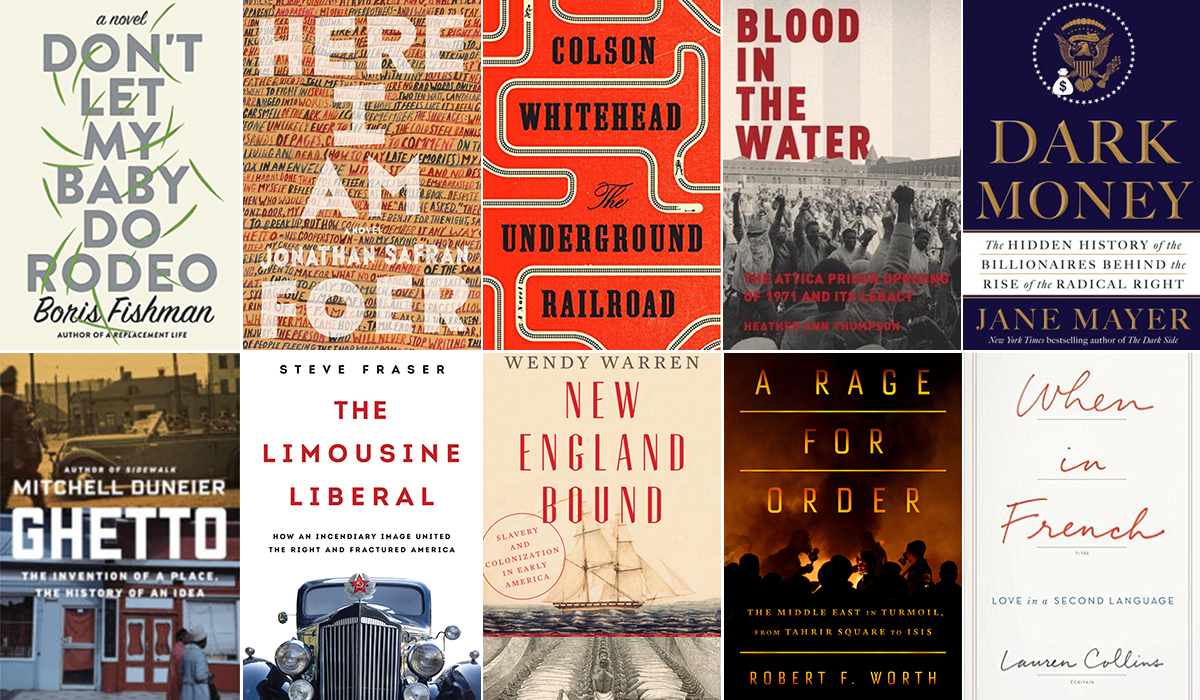Ten books by Princeton alumni and faculty made it on this year’s New York Times 100 Notable Books list. The books range in topic from a fictional American road trip to the history of the Attica prison uprising.
FICTION
Don’t Let My Baby Do Rodeo (Harper Collins)
By Boris Fishman ’01
After a couple from the Soviet Union adopts a boy who turns feral, the family embarks on a road trip from New Jersey to his native Montana for answers. Author Fishman previously published the award-winning A Replacement Life. Fishman received a degree in Russian literature from Princeton and an MFA in fiction from New York University. He teaches creative writing at Princeton.
Here I Am (Farrar, Straus & Giroux)
By Jonathan Safran Foer ’99
Over the course of four weeks in Washington, D.C., the fictional Bloch family must confront the meaning of home as an earthquake in the Middle East sets off a wave of conflict. Foer’s previous works include Eating Animals, Extremely Loud and Incredibly Close, and Everything is Illuminated. He teaches creative writing at New York University.
The Underground Railroad (Doubleday)
By Colson Whitehead
The 2016 National Book Award winner for fiction, The Underground Railroad is an odyssey of a young slave attempting to gain her freedom via the Underground Railroad. The novel has received several awards for its vivid depiction of the pre-Civil War freedom network. Whitehead taught introductory fiction at Princeton in the spring of 2015 and has also taught at Columbia, Wesleyan, and New York University, among others.
NONFICTION
Blood in the Water: The Attica Prison Uprising of 1971 and Its Legacy (Pantheon)
By Heather Ann Thompson *95
This first-ever comprehensive account of the 1971 uprising at Attica Correctional Facility, which led to inmates holding guards and others hostage for four nights, is a narrative of the insurrection and its civil-rights legacy. Thompson regularly writes about mass incarceration for publications like the New York Times, Time magazine, and The Atlantic and is a professor of history at the University of Michigan.
Dark Money: The Hidden History of the Billionaires Behind the Rise of the Radical Right (Doubleday)
By Jane Mayer
Dark Money shows how a group of wealthy libertarians bankrolled a systematic plan to alter American politics. Mayer documents the incorporation of libertarian ideas into government at all levels, even as libertarian views remain largely unpopular with the American public. Mayer previously taught a journalism course at Princeton and has been on the New Yorker staff since 1995.
Ghetto: The Invention of a Place, the History of an Idea (Farrar, Straus & Giroux)
By Mitchell Duneier
A professor of sociology at Princeton, Duneier traces the term ghetto from its beginnings in the 16th century to its revival in Venice, Italy, during World War II to present-day America. Ghetto looks in depth at the scholars and activists who have shaped the conversation about the term and our modern conception of urban poverty. Duneier’s other works include Sidewalk and Slim’s Table.
The Limousine Liberal: How an Incendiary Image United the Right and Fractured America (Basic Books)
By Steve Fraser
In 1969, New York City mayoral candidate Mario Procaccino, a Democrat, coined the term limousine liberal to describe the elite liberals who challenged the status quo from their insular positions of privilege. This label, now co-opted by the right, has spawned a lasting movement, and Fraser argues that understanding the basis for the image of the limousine liberal is essential to understanding politics as it plays out today. Fraser has taught at Princeton, Columbia, the University of Pennsylvania, and New York University.
New England Bound: Slavery and Colonization in Early America (Liveright)
By Wendy Warren
New England Bound exposes the link between slavery and the first century of English colonization in New England, expanding on a timeline that has traditionally been limited to the antebellum Deep South and the Caribbean. Through original research, Warren, assistant professor of history at Princeton, pushes our understanding of the origins of slavery all the way back to 17th-century New England and the role that the earliest colonialists had in trading and selling slaves to plantations in the West Indies.
A Rage for Order: The Middle East in Turmoil, From Tahrir Square to ISIS (Farrar, Straus & Giroux)
By Robert F. Worth *97
Worth tracks the Arab Spring and its aftermath by following an array of characters including a Libyan rebel, a Yemeni farmer, and two young Syrian women. Worth, formerly the chief of the New York Times Beirut bureau, sheds lights on a region in the midst of massive uprisings.
When in French: Love in Second Languages (Penguin Press)
By Lauren Collins ’02
Collins explores how language affects our lives after she falls in love with a Frenchman while living in London. In her memoir, When in French, Collins depicts the trials and the triumphs of learning French and what it means to love someone in a second language. Collins is a New Yorker staff writer based in Europe.

